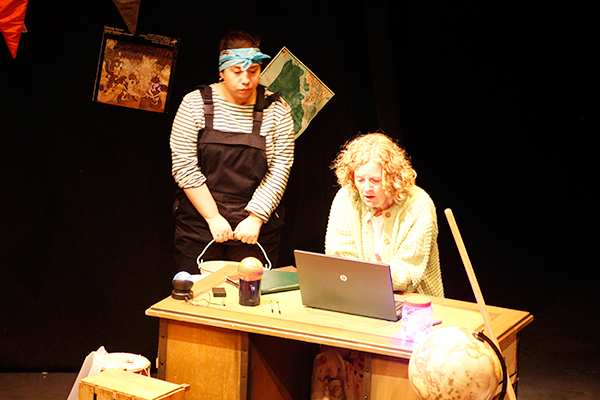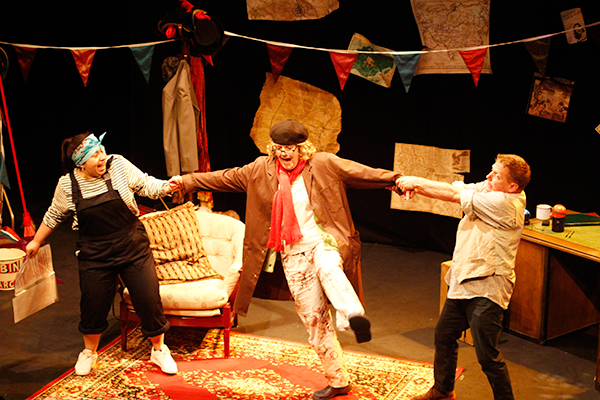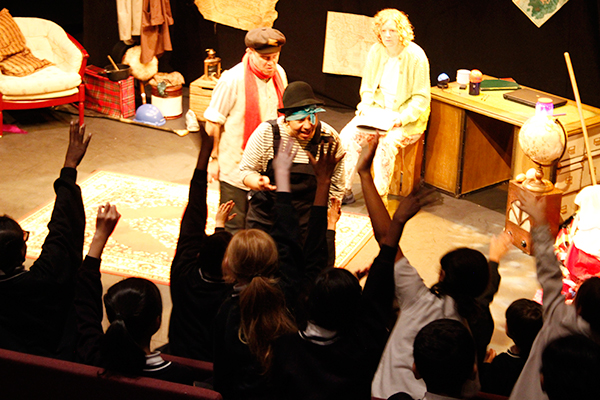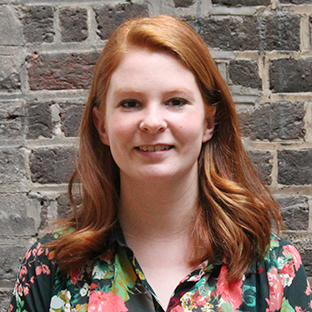Following a week of exciting theatre performances based on children’s writing, Naomi Bath reflects on the value of drama-based learning in the classroom.
Writer’s block. We’ve all been there. Staring at our laptops desperately willing a good idea to come to us. If only we could get our imaginative juices flowing again by telling stories to one another…
Such was the premise of the main character, Melody, in 10 performances at the Birmingham REP Theatre last week. Melody, a fictional Hollywood writer, had ‘lost her imagination’ and was suffering from a terrible case of writer’s block; an affliction that could only be alleviated by the stories of around 1,000 children from across 10 primary schools in the West Midlands (three of which were RSA Academies).

Credit: Gavin Medza / The Play House
These 10 performances by actors from The Play House (based at Birmingham REP) were the culmination of a year-long project designed by the RSA and Arts Connect, funded by the Paul Hamlyn Foundation, to embed drama-based education in primary schools. The project was based on the best practice recommendations of the CUREE report, Developing Great Teaching, and DfE guidelines for CPDL. It was also informed by a growing body of research in how CPDL in drama can support improvements in literacy.
The Performing Pedagogy project established partnerships between 37 primary teachers and 10 drama specialists to build teachers’ skills and confidence in using drama and theatre in the classroom, with the aim of improving pupils’ literacy, language development, and storytelling abilities. Through workshops and CPDL training sessions with drama specialists during the academic year, teachers learnt new drama techniques and tried out peer learning strategies, including lesson study. With those same drama specialists, they planned and integrated creative drama techniques and activities in their classrooms to better engage children in story writing. Teachers have reported feeling increasingly confident using a wide range of drama techniques and that their pupils are not only more engaged in writing, but have also become more confident, independent, and creative.
Indications of these developments were very much on display in the theatre performances last week. In order to help Melody overcome her writer’s block, the children had submitted fragments of stories (expertly woven together by dramaturg Ali Belbin) to give Melody inspiration and ideas for her own writing, which were acted out in fun and adventurous ways. Personal highlights of the stories include:
- a professor’s revolutionary laptop (that only functions when magic fireflies, goblins, and spiders work together),
- a ‘drake’ monster (half dragon, half snake) that freezes in a lake causing humans to fight against global warming to keep the monster trapped in the ice,
- a junk instrument festival being cancelled by a selfish mayor until children pressure him into reinstating it,
- the ruler of Planet X granting children one wish that restores the colour in Gloom Doom City.

Credit: Gavin Medza / The Play House
As children recognised their own work being performed on stage by professional actors, expressions of shock, joy, and even a bit of embarrassment lit up across the auditorium. One particularly memorable moment was when a child leapt from his seat and punched the air as he heard his poem read aloud verbatim.
Actors from The Play House skilfully debunked the myth that putatively ‘serious’ writing is ‘better than’ or ‘disconnected from’ creative storytelling. They easily convinced pupils that telling stories and acting them out is equally valuable – and indeed crucial in the case of relieving Melody’s writer’s block. The actors asked children in the audience which components they thought made a great story (interesting characters, a good plot, adjectives, and so on), their advice on how to engage your imagination (reading other stories for ideas, walking and exploring outside, dressing up in costume and acting out a story), and what the world would be like if we didn’t have stories (boring, lonely, a world without creativity). One pupil responded philosophically to the latter question, with “you wouldn’t have a life because your life is a story”.
Profound perspectives such as these not only make me hopeful for the next generation of storytellers, but also reaffirm the value of encouraging and empowering children to interpret and reimagine the world - a crucial step in the RSA’s mission to unleash the ‘power to create’.

Credit: Gavin Medza / The Play House
The Performing Pedagogy project will soon enter its second year, with support once again generously provided by the Paul Hamlyn Foundation.
If you are interested in this project, please comment below or email me directly.

Join the discussion
Comments
Please login to post a comment or reply
Don't have an account? Click here to register.
I always admired the projects that can make some revolution in the vision of the activity. I mean nowadays the study process looks like something very serious and boring, like a bureaucratic work with papers. But there should be something romantic to make children interested, to let their eyes burn with enthusiasm. That's a good example that shows how important is the role of the teacher and how he interacts with students. I also involved in the development in on of the educational project - . The main goal is to help students with their writings and essays in cases of the lack of inspiration. But this is the whole other level.
This is a really interesting and worthwhile project. I would be very interested to learn more.
An excellent article. I think it is worth remembering that all of us were once great story tellers as children. But the ability to imaginatively tell stories was drummed out of us, at least the majority of us, because it was considered by our betters that it was more appropriate for us to conform to the expectations of society. All this is very well and good when society is at peace with itself. But in times of great change and uncertainty, the needs of society must necessarily call for more creativity; story telling is one of those skills which draws heavily on creativity and it is critical that children are encouraged to retain the ability to tell stories. Who knows...perhaps the key to many of the conundrums besetting our society may become more readily solvable - all thanks to story telling. Please keep going. We desperately need story tellers.
Really interesting article and a terrific project. I'm curious about your point on debunking 'serious writing'. This is an aspect of arts education that is often tapped into through a creative process for participants but is rarely fully realised. In my own field of music, we often categorise projects as 'listening' or 'musicology' or 'composition' or 'performance'. In other words, we segregate the inherently active processes of the industry from the reactive ones. Why can't we be more fluid in our teaching? I think this project is a fantastic example of simultaneous active and reactive learning.